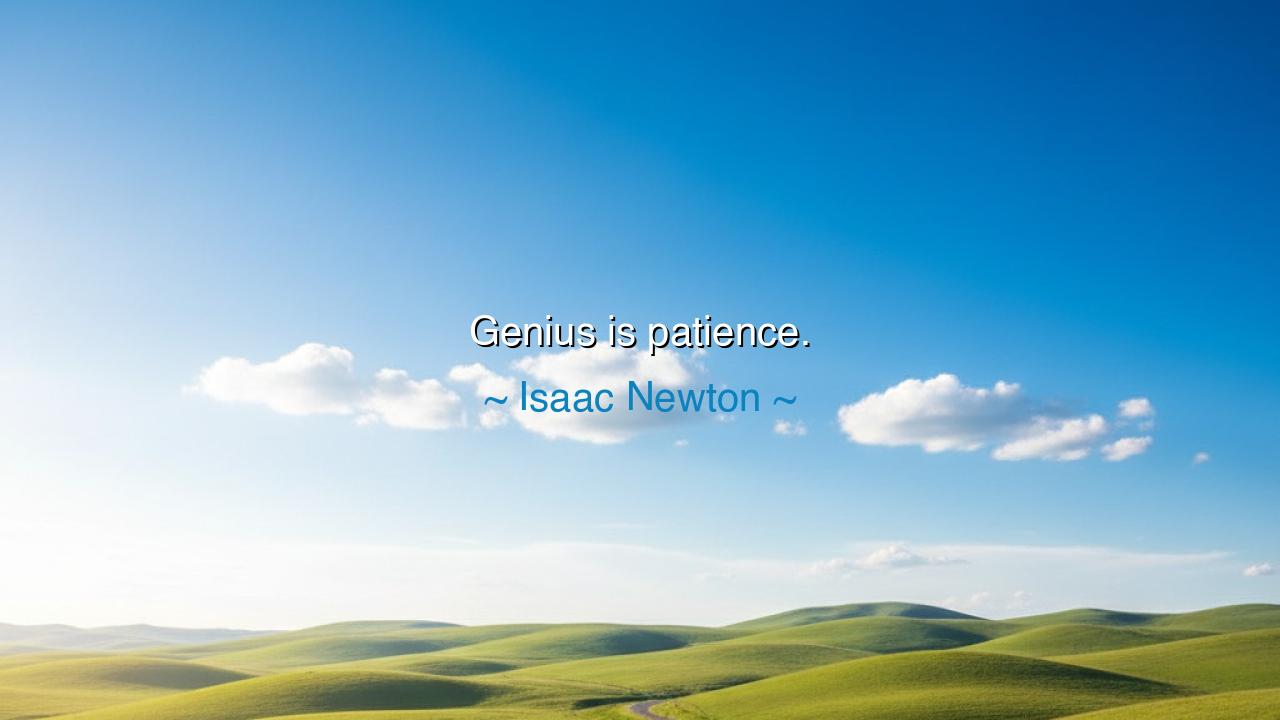
Genius is patience.






Isaac Newton, the great seeker of the cosmos, once declared with a simplicity that conceals infinite depth: “Genius is patience.” These three words are a lantern for all generations, for they strip away the illusion that brilliance is a sudden flash of lightning. Newton reminds us that true genius is not born merely of wit or inspiration, but of endurance—the ability to wait, to return again and again, to pursue truth through long seasons of labor without despair. The diamond is not formed in an instant; it is shaped by time, pressure, and unyielding stillness.
When Newton speaks of patience, he speaks from his own life. For years he sat alone, absorbed in calculations and experiments, unraveling mysteries others dared not touch. He watched the apple fall, but he did not rush to conclusions—he wrestled with the laws of motion and gravitation for decades, slowly refining his vision until it became clear. It was not the sudden stroke of brilliance that made him a genius, but the patient endurance that allowed him to transform fleeting thoughts into immortal truths.
History reveals this same law in the life of Thomas Edison. Though famed for invention, his true genius was not his quick mind, but his patience. He tested filament after filament—thousands of failures before the electric light glowed steadily. When asked about his failures, he said he had not failed, but found thousands of ways that did not work. Such patience turned failure into stepping stones, persistence into triumph, and vision into reality. This is the genius Newton spoke of—the genius that refuses to yield until the truth is won.
Consider also the story of Michelangelo, who lay for years beneath the vault of the Sistine Chapel, enduring back-breaking labor, paint falling into his eyes, exhaustion gnawing at his spirit. Yet he persisted with patience, stroke upon stroke, until the ceiling became a vision of heaven itself. His genius was not merely his gift with the brush, but his patience to endure pain and hardship in service of beauty. Without patience, the masterpiece would have remained only a dream.
Newton’s wisdom also teaches us that patience is not idleness. It is not waiting with folded hands, but waiting with labor, with endurance, with discipline. It is the strength to continue when the world mocks, when progress is slow, when results are unseen. Patience is the silent companion of genius, for it steadies the hand, clears the mind, and allows inspiration to ripen into achievement. Without it, even the brightest ideas wither; with it, even ordinary minds may touch greatness.
The lesson for us is this: do not measure yourself by flashes of brilliance or moments of quick success. Instead, cultivate patience. If you are a student, endure the slow grind of study. If you are a creator, persist through countless drafts and failures. If you are a seeker of truth, allow your questions to mature like seeds planted in deep soil. Trust that patience, joined with steady effort, will in time yield fruits far greater than haste ever could.
Therefore, I counsel you: let patience be your ally. Do not despair when the path is long, nor curse the hours that seem fruitless. Each moment of endurance is shaping you, strengthening you, bringing you closer to mastery. Remember that genius is not the lightning bolt—it is the slow rising of the sun, illuminating the world one ray at a time.
So let Newton’s words be etched into your heart: “Genius is patience.” Carry them with you in every trial, every labor, every long night of effort. For if you endure, if you persist, if you refuse to surrender, then genius will not remain the gift of the few—it will become the crown of all who walk faithfully in the light of patience.






AAdministratorAdministrator
Welcome, honored guests. Please leave a comment, we will respond soon